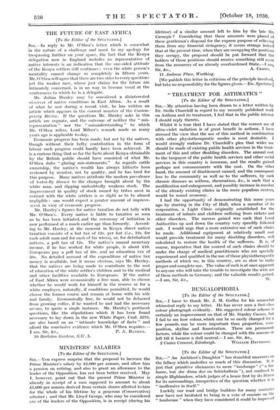THE FUTURE OF EAST AFRICA
[To the Editor of the Srae-raron.] Sin,—In reply to Mr. O'Shea's letter which is somewhat in the nature of a challenge and must be my apology for trespassing further on your space, the fact that the Kenya delegation now in England includes no representative of native interests is an indication that the one-sided attitude of the Kenya settlers still continues : even the white person's mentality cannot change so completely in fifteen years. Mr. O'Shea will agree that there are two sides to every question: yet the weaker race, whose just claims for the future are intimately concerned, is in no way to become vocal at the conferences to which he is a delegate.
Mr. Julian Huxley may be considered a disinterested observer of native conditions in East Africa. As a result of what he saw during a recent visit, he has written an article which appears in the current number of the Contem- porary Review. If the questions Mr. Huxley asks in this article are cognate, and the outcome of neither the " mis- representation " nor the " misunderstanding " to which Mr. O'Shea refers, Lord Milner's remark made so many years ago is applicable to-day.
Economic progress has been made, but not by the natives, though without their hefty contribution in the form of labour such progress could hardly have been achieved. It is a curious thing that so far the facts about Kenya obtainable by the British public should have consisted of what Mr. O'Shea dubs " glaring mis-statements." As regards cattle ownership, the native's wealth has always hitherto been reckoned by number, not by quality, and he has bred for this purpose. Many natives attribute the modern prevalence of tsetse-fly disease to the changes brought about by the white man, and dipping undoubtedly weakens stock. The improvement in quality of stock owned by tribes most in contact with the white settlers is so slight as to be almost negligible : one would expect a greater amount of improve- ment in view of economic progress.
Mr. Huxley's figures for native taxation do not tally with Mr. O'Shea's. Every native is liable to taxation as soon as he has been initiated, and the ceremony of initiation is now performed at a much earlier age than formerly. Accord- ing to Mr. Huxley, at the moment in Kenya direct native taxation consists of a but tax of 12s. per but (i.e., 12s. for each adult man and for each of his wives), or, for detribalized natives, a poll tax of 12s. The native's annual monetary income, if he has worked for white people, is about £10. Europeans pay a poll tax of 30s. and an education tax of 30s. No detailed account of the expenditure of native tax money is available, but it seems obvious, says Mr. Huxley, that the natives are being made to contribute to the cost of education of the white settler's children and to the medical and other facilities available to Europeans. If the native of East Africa were economically a free man, able to choose whether he would work for himself in the reserve or for a white employer, naturally, if conditions permitted, he would choose the former course and remain at home with his wife and family. Economically free, he would not be debarred from growing coffee, if he wanted to and had the necessary means, to quote a single instance. Mr. Huxley's pertinent questions, like the stipulations which it has been found necessary to lay down in the new White Paper, Cmd. 3573, are also based on an " intimate knowledge of facts " and afford the conclusive evidence which Mr. O'Shea requires.—
























































 Previous page
Previous page